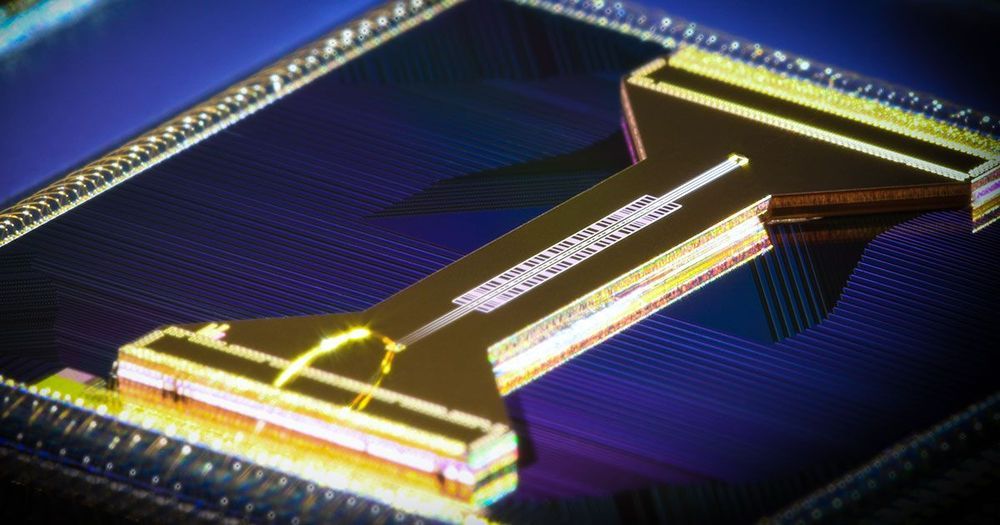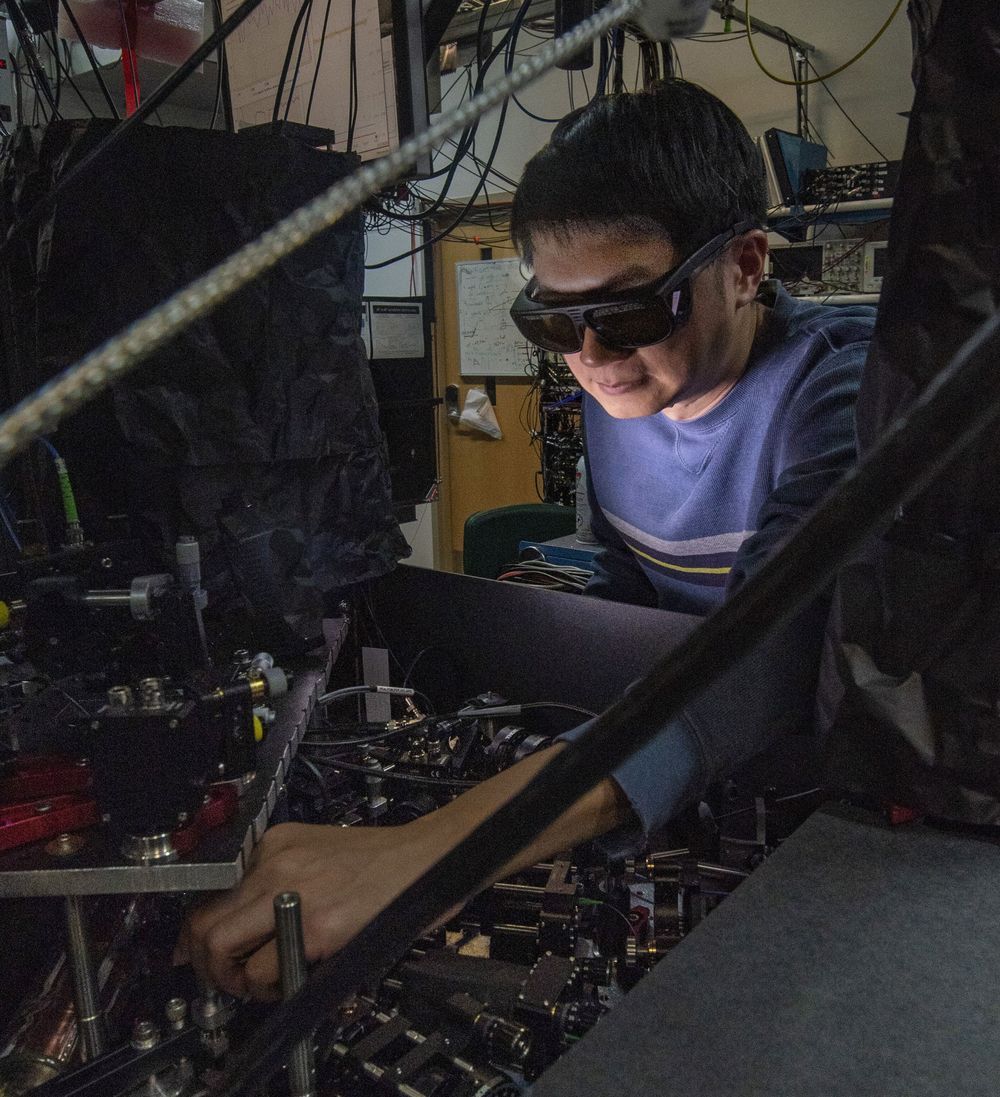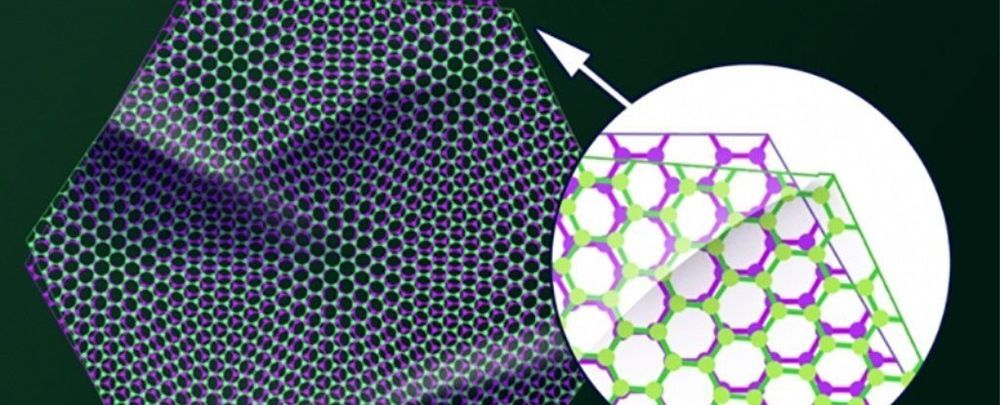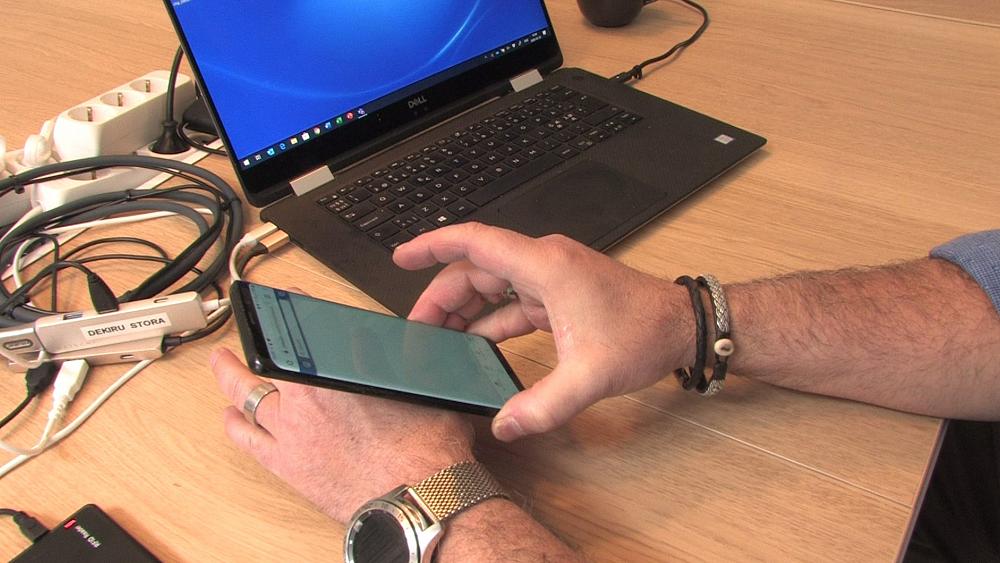Superior qubits key to rapid increase in power.



Physicists at the National Institute of Standards and Technology have boosted their control of the fundamental properties of molecules at the quantum level by linking or “entangling” an electrically charged atom and an electrically charged molecule, showcasing a way to build hybrid quantum information systems that could manipulate, store and transmit different forms of data.
Described in a Nature paper posted online May 20, the new NIST method could help build large-scale quantum computers and networks by connecting quantum bits (qubits) based on otherwise incompatible hardware designs and operating frequencies. Mixed-platform quantum systems could offer versatility like that of conventional computer systems, which, for example, can exchange data among an electronic processor, an optical disc, and a magnetic hard drive.
The NIST experiments successfully entangled the properties of an electron in the atomic ion with the rotational states of the molecule so that measurements of one particle would control the properties of the other. The research builds on the same group’s 2017 demonstration of quantum control of a molecule, which extended techniques long used to manipulate atoms to the more complicated and potentially more fruitful arena offered by molecules, composed of multiple atoms bonded together.

To many developers, quantum computing may still feel like a futuristic technology shrouded in mystery and surrounded by hype. It’s some mystic dance of 1s and 0s that will enable some calculations in mere hours that today would take the lifetime of the universe to compute. It’s somehow related to a cat that may or may not be dead in a box.
The question we hear most often from developers is how do you make sense of what’s real and get started?
Over the last year, we’ve been working with you, the pioneering community of quantum developers, to understand what all developers will need on the path to scalable quantum computing. You’ve told us that you want to learn more about where quantum could impact your business today, to have easier ways to start writing quantum code, and to run applications against a range of quantum and classical hardware.

Scientists are using light waves to accelerate supercurrents and access the unique properties of the quantum world, including forbidden light emissions that one day could be applied to high-speed, quantum computers, communications and other technologies.
The scientists have seen unexpected things in supercurrents—electricity that moves through materials without resistance, usually at super cold temperatures—that break symmetry and are supposed to be forbidden by the conventional laws of physics, said Jigang Wang, a professor of physics and astronomy at Iowa State University, a senior scientist at the U.S. Department of Energy’s Ames Laboratory and the leader of the project.
Wang’s lab has pioneered use of light pulses at terahertz frequencies- trillions of pulses per second—to accelerate electron pairs, known as Cooper pairs, within supercurrents. In this case, the researchers tracked light emitted by the accelerated electrons pairs. What they found were “second harmonic light emissions,” or light at twice the frequency of the incoming light used to accelerate electrons.

It sounds like a riddle: What do you get if you take two small diamonds, put a small magnetic crystal between them and squeeze them together very slowly?
The answer is a magnetic liquid, which seems counterintuitive. Liquids become solids under pressure, but not generally the other way around. But this unusual pivotal discovery, unveiled by a team of researchers working at the Advanced Photon Source (APS), a U.S. Department of Energy (DOE) Office of Science User Facility at DOE’s Argonne National Laboratory, may provide scientists with new insight into high-temperature superconductivity and quantum computing.
Though scientists and engineers have been making use of superconducting materials for decades, the exact process by which high-temperature superconductors conduct electricity without resistance remains a quantum mechanical mystery. The telltale signs of a superconductor are a loss of resistance and a loss of magnetism. High-temperature superconductors can operate at temperatures above those of liquid nitrogen (−320 degrees Fahrenheit), making them attractive for lossless transmission lines in power grids and other applications in the energy sector.

Computer systems that can automatically generate image captions have been around for several years. While many of these techniques perform considerably well, the captions they produce are typically generic and somewhat uninteresting, containing simple descriptions such as “a dog is barking” or “a man is sitting on a bench.”
Alasdair Tran, Alexander Mathews and Lexing Xie at the Australian National University have been trying to develop new systems that can generate more sophisticated and descriptive image captions. In a paper recently pre-published on arXiv, they introduced an automatic captioning system for news images that takes the general context behind an image into account while generating new captions. The goal of their study was to enable the creation of captions that are more detailed and more closely resemble those written by humans.
“We want to go beyond merely describing the obvious and boring visual details of an image,” Xie told TechXplore. “Our lab has already done work that makes image captions sentimental and romantic, and this work is a continuation on a different dimension. In this new direction, we wanted to focus on the context.”

Fingerprints and DNA are widely known forms of biometrics, thanks to crime dramas on television. But as technology advances the Internet of Things, the interconnection of computer devices in common objects, other forms of biometrics are sought for security. For example, distinctive physical characteristics of users are increasingly used in computer science as forms of identification and access restriction. Smartphones use fingerprints, iris scans and face recognition in this way. Other biometrics that are likely to come into use include retinas, veins and palm prints.
The ear is another potential biometric. According to research published recently in the Journal of Electronic Imaging, ear recognition technology, or “earprints,” could one day be used as personal identification to secure smart homes via smartphones.

As computers get more powerful and connected, the amount of data that we send and receive is in a constant race with the technologies that we use to transmit it. Electrons are now proving insufficiently fast and are being replaced by photons as the demand for fiber optic internet cabling and data centers grow.
Though light is much faster than electricity, in modern optical systems, more information is transmitted by layering data into multiple aspects of a light wave, such as its amplitude, wavelength and polarization. Increasingly sophisticated “multiplexing” techniques like these are the only way to stay ahead of the increasing demand for data, but those too are approaching a bottleneck. We are simply running out of room to store more data in the conventional properties of light.
To break through this barrier, engineers are exploring some of light’s harder-to-control properties. Now, two studies from the University of Pennsylvania’s School of Engineering and Applied Science have shown a system that can manipulate and detect one such property known as the orbital angular momentum, or OAM, of light. Critically, they are the first to do so on small semiconductor chips and with enough precision that it can be used as a medium for transmitting information.

Graphene has already proven itself to be a weird and wonderful material in many different ways, but its properties get even more unusual and exotic when it’s twisted – and two new studies have given scientists a much closer look at this intriguing phenomenon.
When two sheets of graphene are put together at slightly different angles, the resulting material becomes either very effective at conducting electricity, or very effective at blocking it. It’s known as ‘magic-angle’ twisted graphene, and knowing more about how and why this happens could lead to advances in high-temperature superconductors and quantum computing.
Now for the first time, scientists have mapped out a twisted graphene structure in its entirety, and at a very high resolution. They’ve also been able to get ‘graphene twistronics’ working with four layers of graphene as well as just two.
